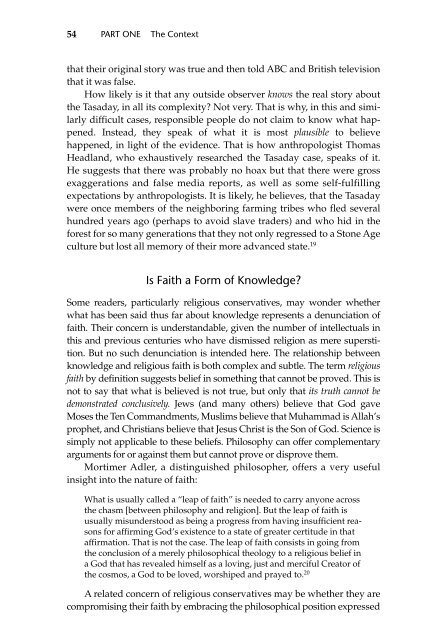Beyond Feelings
Beyond Feelings
Beyond Feelings
You also want an ePaper? Increase the reach of your titles
YUMPU automatically turns print PDFs into web optimized ePapers that Google loves.
54 PART ONE The Context<br />
that their original story was true and then told ABC and British television<br />
that it was false.<br />
How likely is it that any outside observer knows the real story about<br />
the Tasaday, in all its complexity? Not very. That is why, in this and similarly<br />
difficult cases, responsible people do not claim to know what happened.<br />
Instead, they speak of what it is most plausible to believe<br />
happened, in light of the evidence. That is how anthropologist Thomas<br />
Headland, who exhaustively researched the Tasaday case, speaks of it.<br />
He suggests that there was probably no hoax but that there were gross<br />
exaggerations and false media reports, as well as some self-fulfilling<br />
expectations by anthropologists. It is likely, he believes, that the Tasaday<br />
were once members of the neighboring farming tribes who fled several<br />
hundred years ago (perhaps to avoid slave traders) and who hid in the<br />
forest for so many generations that they not only regressed to a Stone Age<br />
culture but lost all memory of their more advanced state. 19<br />
Is Faith a Form of Knowledge?<br />
Some readers, particularly religious conservatives, may wonder whether<br />
what has been said thus far about knowledge represents a denunciation of<br />
faith. Their concern is understandable, given the number of intellectuals in<br />
this and previous centuries who have dismissed religion as mere superstition.<br />
But no such denunciation is intended here. The relationship between<br />
knowledge and religious faith is both complex and subtle. The term religious<br />
faith by definition suggests belief in something that cannot be proved. This is<br />
not to say that what is believed is not true, but only that its truth cannot be<br />
demonstrated conclusively. Jews (and many others) believe that God gave<br />
Moses the Ten Commandments, Muslims believe that Muhammad is Allah’s<br />
prophet, and Christians believe that Jesus Christ is the Son of God. Science is<br />
simply not applicable to these beliefs. Philosophy can offer complementary<br />
arguments for or against them but cannot prove or disprove them.<br />
Mortimer Adler, a distinguished philosopher, offers a very useful<br />
insight into the nature of faith:<br />
What is usually called a “leap of faith” is needed to carry anyone across<br />
the chasm [between philosophy and religion]. But the leap of faith is<br />
usually misunderstood as being a progress from having insufficient reasons<br />
for affirming God’s existence to a state of greater certitude in that<br />
affirmation. That is not the case. The leap of faith consists in going from<br />
the conclusion of a merely philosophical theology to a religious belief in<br />
a God that has revealed himself as a loving, just and merciful Creator of<br />
the cosmos, a God to be loved, worshiped and prayed to. 20<br />
A related concern of religious conservatives may be whether they are<br />
compromising their faith by embracing the philosophical position expressed


